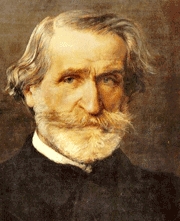On this date in 1813, Italy’s great composer, Giuseppe Verdi, was born to a humble family in Le Roncole, a village near Busseto. He started music lessons with the village church organist at age 7. He was turned away from a conservatory in Milan, but studied privately. His first opera, “Oberto,” was produced at La Scala in 1839. Many operas would follow, including “Rigoletto” (1851), “Il Trovatore” (1853), “La Traviata” (1853) and “Les Vepres Siciliennes” (which was criticized by clergy, 1855).
The composer of “Don Carlos” (1867), “Aida” (1870), “Otello” (1886) and “Falstaff” (1893) was acclaimed internationally and regarded by contemporaries as the greatest Italian composer of his century. Verdi’s early personal life was marked by family tragedies, including the death of his sister at age 17. He married Margherita Barezzi, the daughter of a patron, in 1836 and she gave birth to children in 1837 and 1838 but both died in infancy. Margherita died of encephalitis at age 26.
Verdi was generally anti-clerical and a rationalist. He sympathized with 19th-century campaigns for freedom. At the end of his career, Verdi shared his wealth, endowing the city of Milan with two million lire in 1898 to establish a home for aging musicians, the grounds of which became his final resting place. He also provided funds for a hospital near Busseto.
He married soprano Giuseppina Strepponi in 1859 after they had lived together for several years, a scandalous cohabitation in the eyes of some. She died in 1897. Later in life Strepponi wrote: “I exhaust myself in speaking to him about the marvels of the heavens, the earth, the sea, etc. It’s a waste of breath! He laughs in my face and freezes me in the midst of my oratorical periods and my divine enthusiasm by saying ‘you’re all crazy,’ and unfortunately he says it with good faith.” (Verdi: A Biography by Mary Jane Phillips-Matz, 1993.)
Verdi died of a stroke in 1901 at age 87. “[My funeral is to be without] any part of the customary formulae,” Verdi wrote in his will (cited by F.T. Garibaldi in Giuseppe Verdi, 1903). An estimated 300,000 people came to his memorial service in Milan, where Arturo Toscanini directed musicians and a choir of over 800 voices in Verdi’s Va, pensiero (known as the chorus of the Hebrew slaves) from “Nabucco.” (D. 1901)

